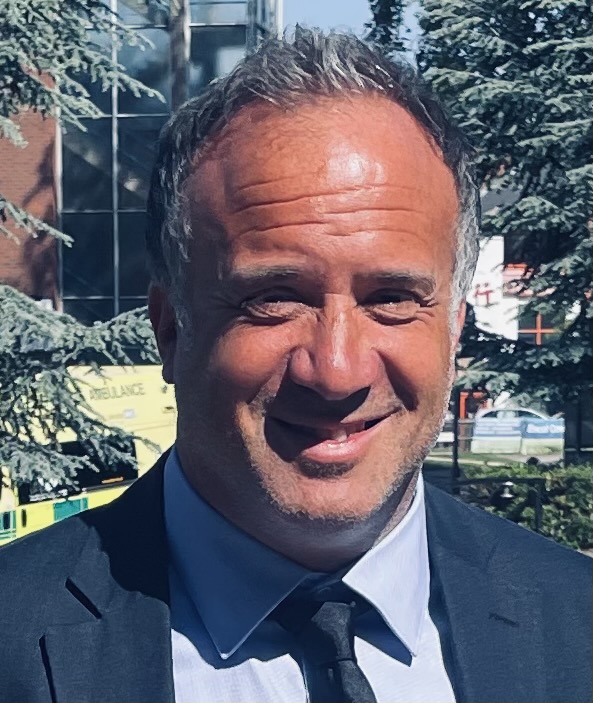
Miles' nominator said:
"Miles Levy and his team at the endocrine department at the Leicester Royal Infirmary have really looked after me since I self diagnosed myself with a Pituitary tumour. My GP wouldn’t listen to me even though I had 98% of the classic Acromegaly symptoms. On my first visit to Miles in 2018 I felt reassured I was in the right place to be listened to at last. They still look after me now with once a year check ups but I know they are always on the end of the phone if I need them. They are all fantastic and think they should be shown appreciation with an award."
This is what Miles told us:
What’s your story? Why did you start doing what you’re doing, how long have you been doing it?
I've been interested in endocrinology ever since I was a teenager at Chigwell School. My Biology Teacher Dr Applin (who had a huge combover) enthused about the pituitary gland being the 'conductor of the endocrine orchestra' and I was hooked. I was fascinated by the way the pituitary gland develops, making it the link between the outside and inside world. I went on to study medicine at The London Hospital and Barts Medical school and all my role models were endocrinologists. I have always been amazed how a gland so small, can have such a major effect on the body.
Why you got involved?
I went on to specialise in endocrinology and my first research project was on headache and pituitary tumours. I wrote an article called 'Pituitary Tumours What a Headache!' and was inundated with patients from the Pituitary Foundation wanting to help. Since then, I've always loved looking after patients with pituitary problems and continue to find it fascinating. Together with colleagues we go to Uzbekistan to help set up pituitary services which is a joy. Recently I have helped the campaign to change the name of Diabetes Insipidus to AVP-D which has been a real team effort between colleagues and patients.
What would you like to see happen in The Pituitary Foundation for next 30 years?
The main thing is to keep it alive. It is a very difficult time financially for charities like the Pituitary Foundation. It requires the goodwill of patients and clinicians to give good and helpful information to people and families who may be struggling to get good information and access to treatment. With our work around the world with name change to AVP-D, I have seen the high regard in which the UK's Pituitary Foundation is held, and we should work on forging stronger bonds with our international counterparts such as WAPO (World Alliance of Pituitary Organisations) and Got AVP-D. The future is bright!

This is what Gail's nominator said:
"Gail gave me great tips on how to manage my condition. I received information and leaflets which was extremely helpful. We organised a patient conference in Ireland, Gail flew over and gave hope to many of us who had been recently diagnosed. She worked tirelessly despite being a patient herself. Her advice was empathetic yet practical. I am grateful for meeting her, she gave me an honest, no-nonsense approach to the conditions which very much helped me at the time."
.
.
This is what Gail told us:
What’s your story? Why did you start doing what you’re doing, how long have you been doing it?
In 1993, there was no Pituitary Foundation and I wanted to start up something to support pituitary patients but, this would very much have been, a ‘one-man band’. Contacting the SfE, I was invited to the National Launch on 23rd November 1994 and remember sitting in an ante-room with 5 other patients chatting about how to get local support groups off the ground. I naively said “I’m happy to co-ordinate”. Fatal last words! I became a trustee and as a volunteer took on the role of National Co-ordinator helping to kick-start 28 support groups around the UK and Southern Ireland.
Why you got involved?
I remember the awful experience (understatement) happening over several years leading up to me diagnosing myself as a pituitary patient. My personal ‘hell’ whilst thinking I was going bonkers; my GP only suggesting beta blockers and anti-depressants. That was at the end of 1992 and following trans sphenoidal surgery, radiotherapy plus fighting to recover, I just knew other pituitary patients needed support and to know they were not alone. In 1995 the then Portsmouth & Southampton support group launched and together with great committee members over the years, I am proud to still head this as an Area Co-ordinator 29 years later.
What would you like to see happen in The Pituitary Foundation for next 30 years?
If I’m around for another 30 years, it would be great to have more local support groups and the necessary championing of these groups. The Foundation’s history with LSGs shows this to be an integral element for increasing and maintaining the vital local link with pituitary patients. An amazing achievement to go down in history would be an Epipen type device for adrenal insufficient patients in the event of an emergency!

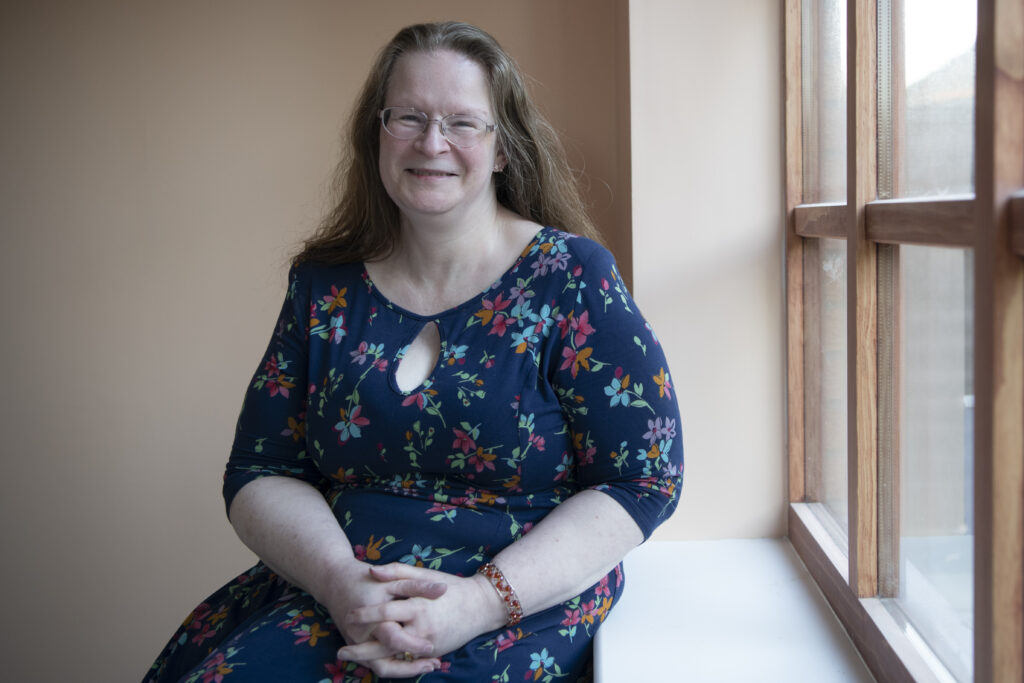
Sue's nominator said:
"Always so supportive of the charity whether that's speaking at events, volunteering her time or writing articles for Pituitary Life. Sue has done masses for The Pituitary Foundation over the years and is a true hero in every sense of the word."
.
.
This is what Sue told us:
- What’s your story? Why did you start doing what you’re doing, how long have you been doing it?
I was introduced to the Pituitary Foundation by one of my PhD supervisors when I was studying at the University of the West of England 20 years ago. I worked on the first needs analysis study as part of my professional development as a psychologist.
- Why you got involved?
Our initial research showed that we’d barely scratched the surface in terms of understanding how people are affected by pituitary conditions. Trying to understand and support patients through research and the development of psychoeducational materials has become something of a passion – it feels like I’m doing something useful.
- What would you like to see happen in The Pituitary Foundation for next 30 years?
I’d like it to be easier for people to get to the Foundation with better signposting from the NHS. I’d like to see the psychoeducation materials expand and for the Foundation to introduce some training for healthcare professionals so that they feel more confident in supporting patients with the psychological aspects of life with a pituitary condition.

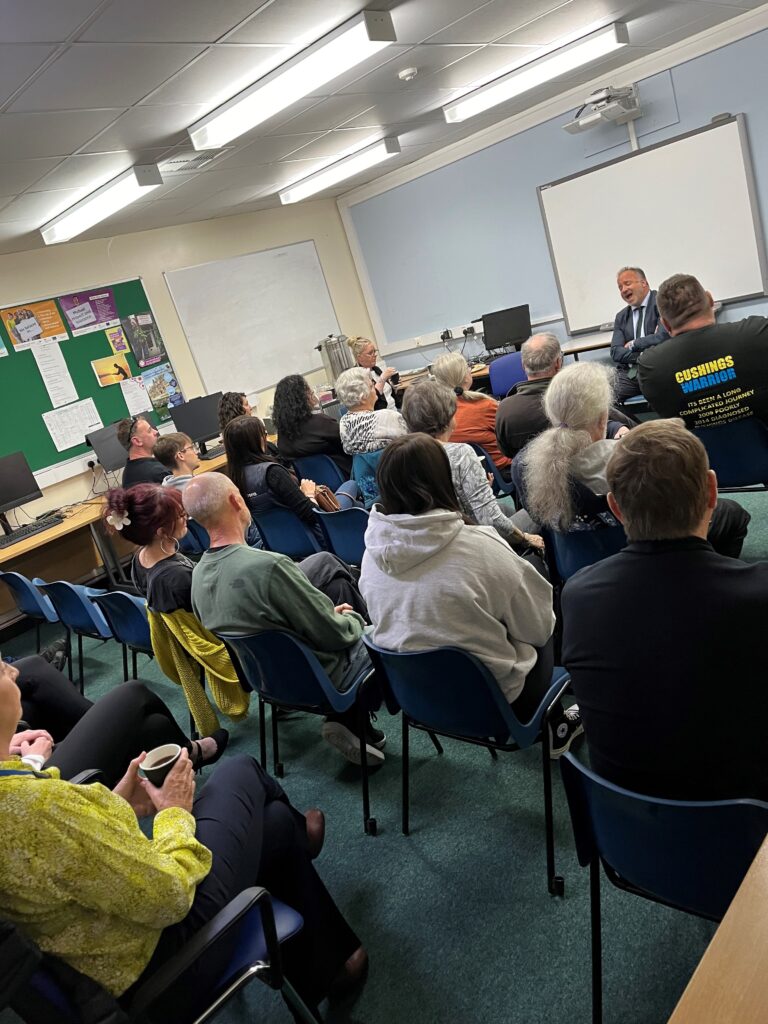
Hannah's nominators said:
"Hannah has recently started the Coventry support group with so much care, love and skill. Hannah constantly tries to come up with new and supportive ideas for everyone, is super welcoming and very engaged in her community. She has also presented her personal story at the Cushing's Day in March 2024 which inspired many people present and led to lovely conversations throughout the day. She is also a fundraiser and she singlehandedly has raised over £600 for the group which she partly uses to get good catering, book warm and comfortable rooms among other things. She has truly done so much more than you would expect from one volunteer and absolutely deserves to be recognised for all the hard work and commitment she selflessly dedicates to the cause."

This is what Hannah told us:
What’s your story? Why did you start doing what you’re doing, how long have you been doing it?
I started to get poorly when I was 30 years old I gained a lot of weight, my mental health deteriorated I had severe acne and my bones were brittle. It took me 2.5 years to get diagnosed with Cushing’s Disease, after having numerous doctors’ appointments with no help I eventually diagnosed myself after googling my symptoms and got referred to an endocrinologist at University Hospital Coventry and Warwickshire.
I gained nearly ten stone in weight by the time I had my surgery and was extremely unwell.
I had transsphenoidal surgery in 2021 to remove the tumour which was a success and then had adrenal insufficiency for 2 years.
I’m still in remission and I’m healing myself each day. I finally feel happy again.
Now I run the Coventry support group to help others with pituitary conditions, I have been running the group since October last year and we have had 6 group meetings already and walks in the park which people really enjoyed.
I’m currently planning the next event a Picnic in the park a chance for us all to get together, these groups not only help people from our community they also help me too.
- Why you got involved?
Meeting others going through such life changing conditions really makes me feel grateful and I am inspired by their strength and resilience it’s an honour for me to be able to meet them!
I chose to run this group as I want to give back and share my experiences with everyone to try to help. I know how isolated you can feel with a pituitary condition, a rare disease and by running this group and building a community we can help each other and not feel so alone!
The pituitary foundation is such a wonderful charity and I know that the support, the groups and all the hard work they do really is so beneficial to everyone with a pituitary condition I am grateful I get to work with them and get to meet such wonderful people throughout my journey.
- What would you like to see happen in The Pituitary Foundation for next 30 years?
Over the next few years I hope to continue to grow this group and even go further afield and help others that don’t have a support group in their area. I plan to work closely with the Pituitary Foundation and help with raising money, I also would love to host a Gala event too to help raise money for such a wonderful cause.
I would love to see the pituitary foundation continue to grow and to raise more awareness for pituitary conditions, the work they do is commendable and truly amazing!

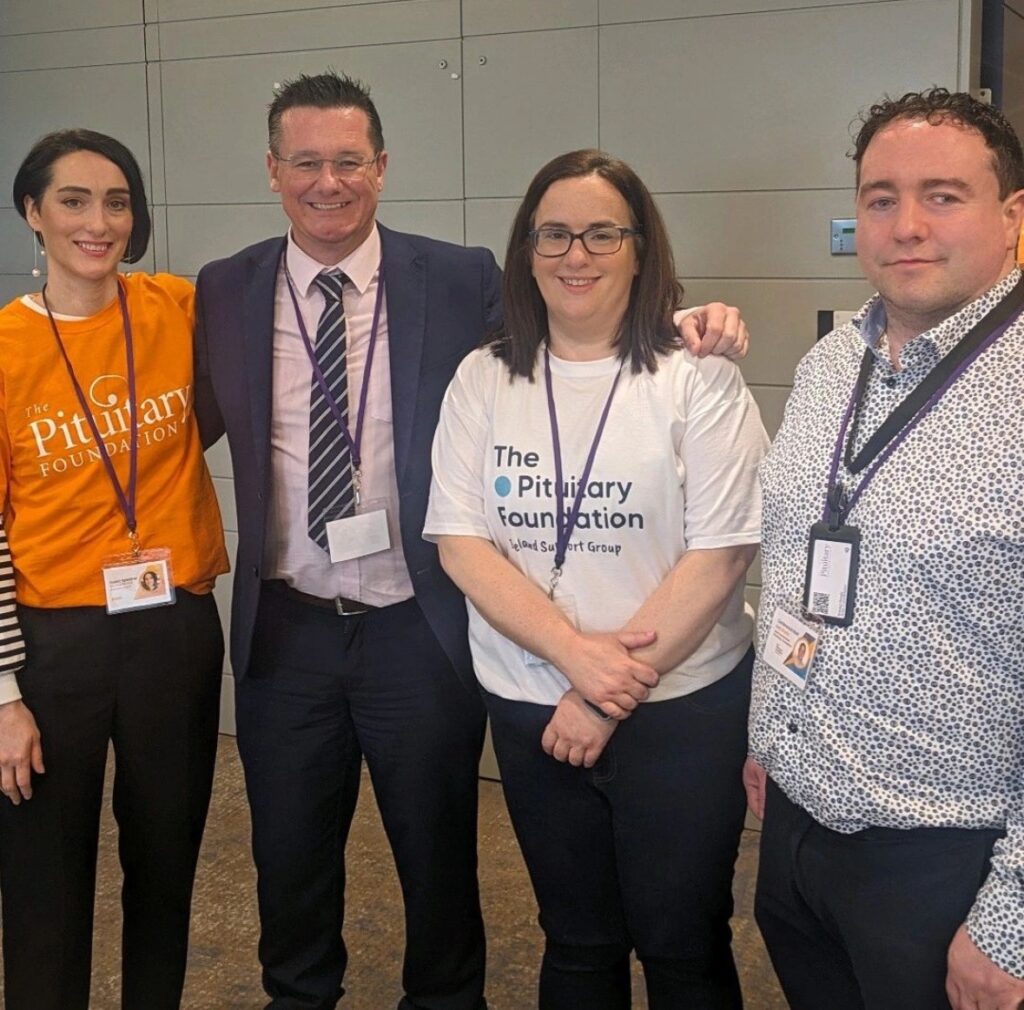
Robert's nominator said:
"Bob has been volunteering with the Pituitary Foundation Ireland Support Group as area coordinator for almost 10 years now.
While he also works full time & supports his family, he also manages to support newly diagnosed patients via phone call, email and via social media platforms.
Bob shares excellent & beneficial information on social media platforms to help patients and raise awareness.
Bob connects patients and collaborates with medical professionals."
This is what Robert told us:
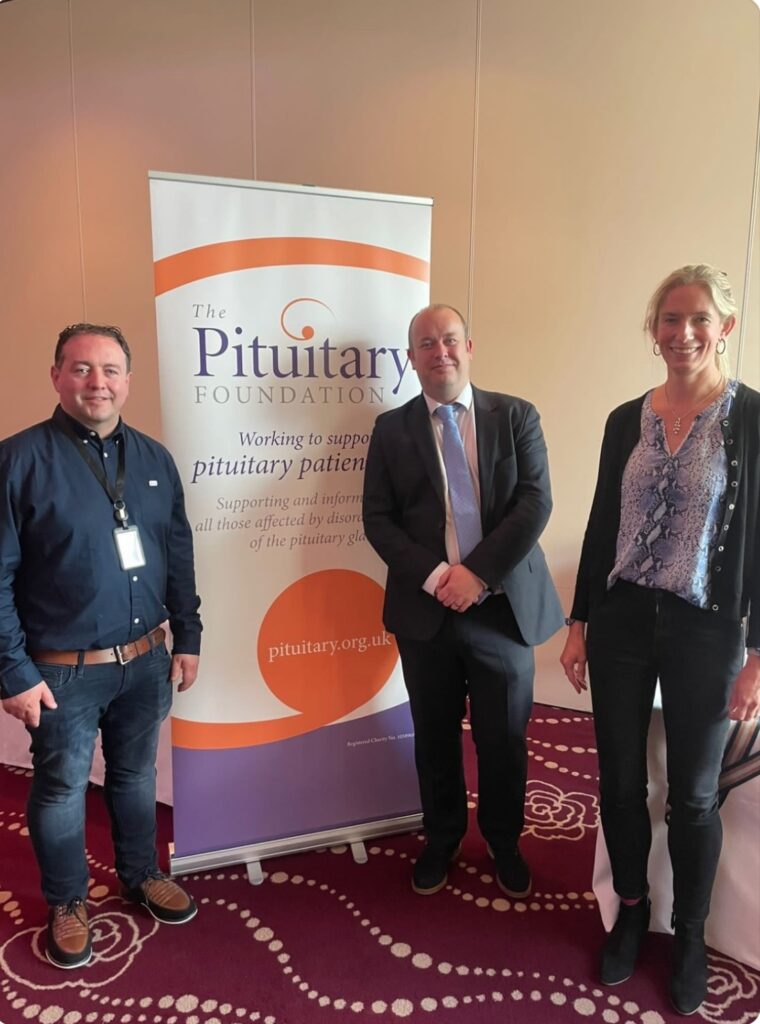
- What’s my Story?
I am Bob Brady, I am from Ireland, I am married to my wife Breege and we have an 8-year-old Boy named Cormac.
I was diagnosed with a craniopharyngioma tumour on my Pituitary Gland at the age of 11 in 1991, had tumour & my pituitary gland removed in May 1992, as a result I have a rare pituitary condition called panhypopituitarism. I have to take hormone replacement therapy daily, and see a variety of medical professionals.
In my twenties and early thirties, I had searched for support groups In Ireland, but couldn’t find any information online. After finding the Pituitary Foundation UK Website and attending an event, I felt encouraged and wanted to offer support to people living with Pituitary Gland conditions in Ireland, I wanted to create an online community to raise awareness, where people could connect, and share stories.
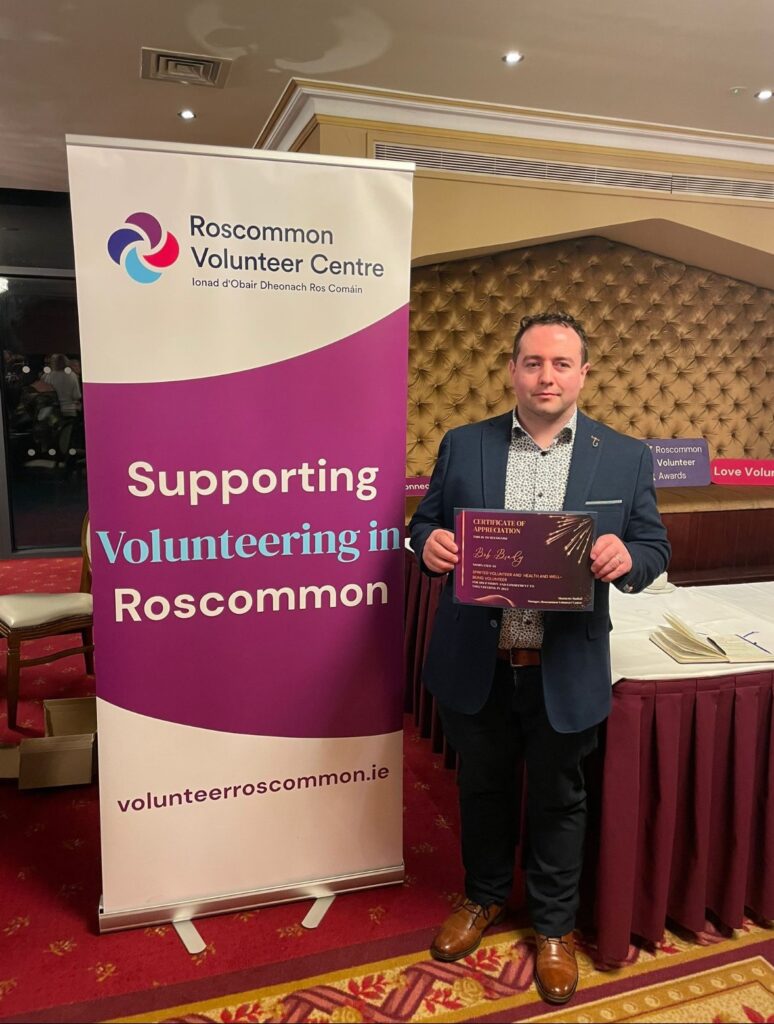
- Why I got involved
After attending events held by the Ireland Support Group coordinator, I was asked if I would take over the position in 2014.
As previously stated I wanted to offer support and information to people living with pituitary gland conditions in Ireland, I wanted to also raise awareness amongst medical professionals, create an independent website and social media presence.
As of January 2023, I am also a director with the World Alliance of Pituitary Organizations (WAPO).
During the 9-year period as coordinator I have held Annual Conferences for patients and medical professionals, I have been nominated for volunteer awards and won prestige awards for Healthcare non-profit of the Year 2021-2023.
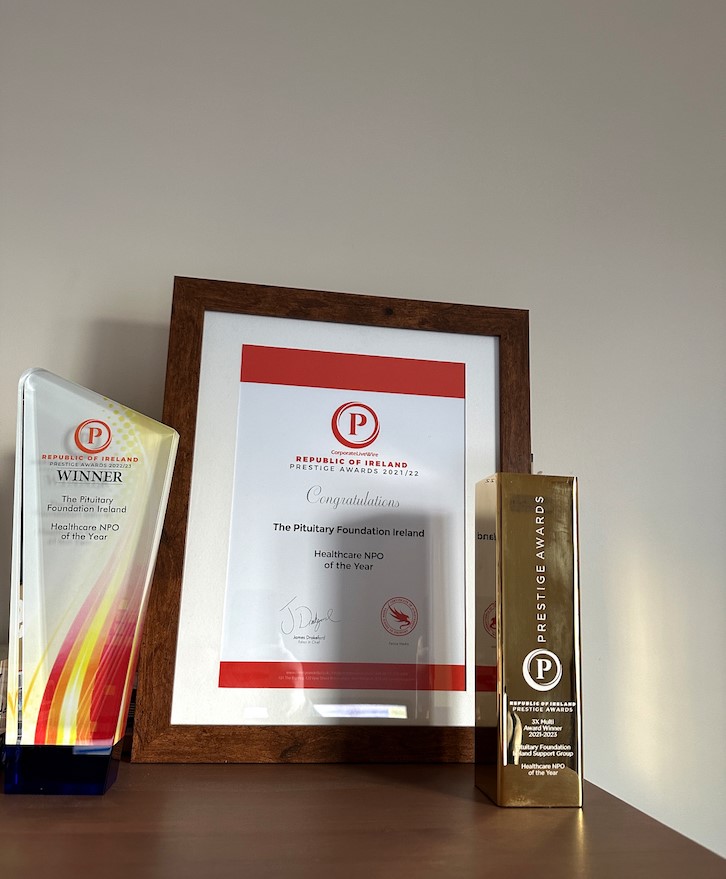
- What would I like to see happen in the Pituitary Foundation for the next 30 years?
In the past number of years the Pituitary Foundation has had a number of significant changes, new team members, a brand refresh, new website, new resources and support groups, including new telephones support services.
I would like to see greater awareness amongst GPs and Medical professionals to reduce the diagnosis journey for people living with the rare conditions of the Pituitary Gland. I have no doubt the Pituitary Foundation will continue the amazing support and resources offered well in to the future.
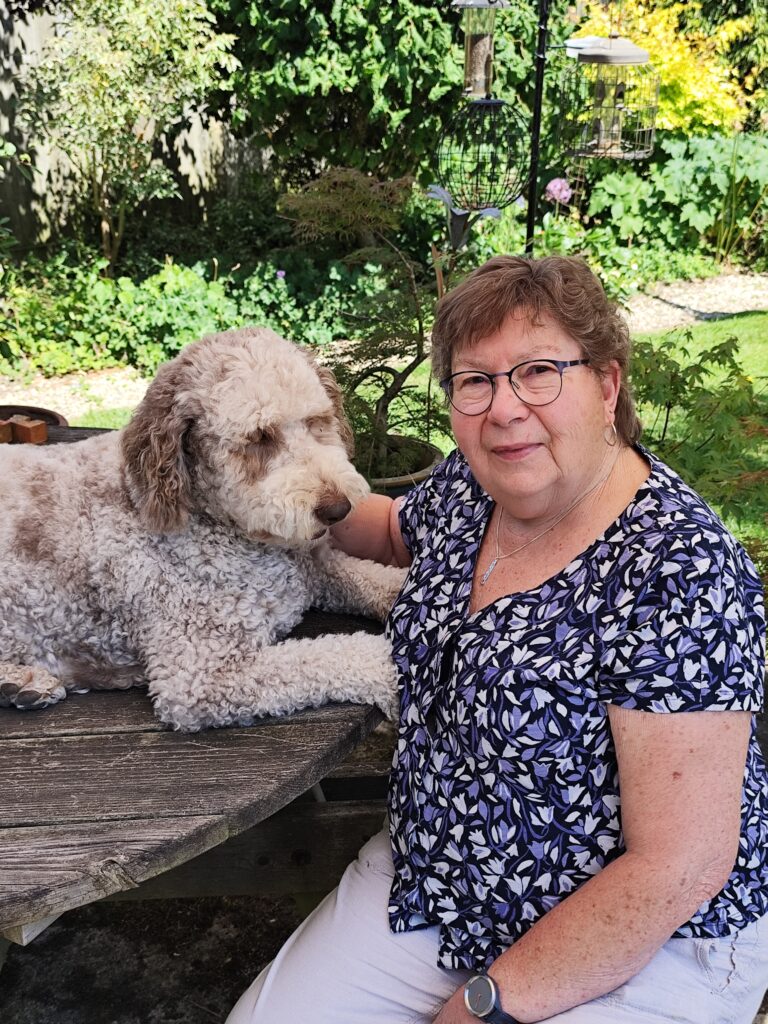
Pauline’s nominators said:
“Despite having her own pituitary/medical issues she has founded and runs the Cushing’s UK Facebook Group. She goes out of her way to support group members. She does it with so much dedication and passion its unbelievable. She will never leave a question unanswered and has been the lifeline for knowledge and support for many people. She personally welcomes every single member, responds to almost every post with fantastic information and links and works tirelessly with many research opportunities and directly with endos to ensure the whole journey of Cushing’s is constantly being improved. Even when she was in hospital for a few months last year she was logged on every day, helping other members of the group despite being incredibly ill herself. She deals with everyone in a patient, supportive, informative manner even when emotions are running high and is always up to date with the latest information.”
This is what Pauline told us:
My pituitary tumour was found by chance but didn’t start producing excess ACTH until 18months later. I was tested & diagnosed with Cushing’s Disease. Although a retired nurse I didn’t know a lot about Cushing’s or Secondary Adrenal Insufficiency. I didn’t get much support from the hospital team so turned to social media for groups. The only ones I found were US based but their health system was so different to ours, so decided to start one for people in the UK. This was July 2016.
I had no idea what would happen or if people were interested, however with a small core of us the group has grown to 2,500 members with another 1000 having been through the group.
I wanted to be able to inform people about Cushing’s & in doing so encourage them to advocate for themselves to get the treatment they deserve.
I couldn’t do it without the support of my other Admins & several of the leading Endocrinologists.
I was already a member of the PF & as the group began to grow we came under their “umbrella“.
The PF has continued to grow & develop over the years, I hope this continues as the need to educate both medics & the public is essential for all of us dealing with a pituitary condition.
Happy 30th Birthday Pituitary Foundation!
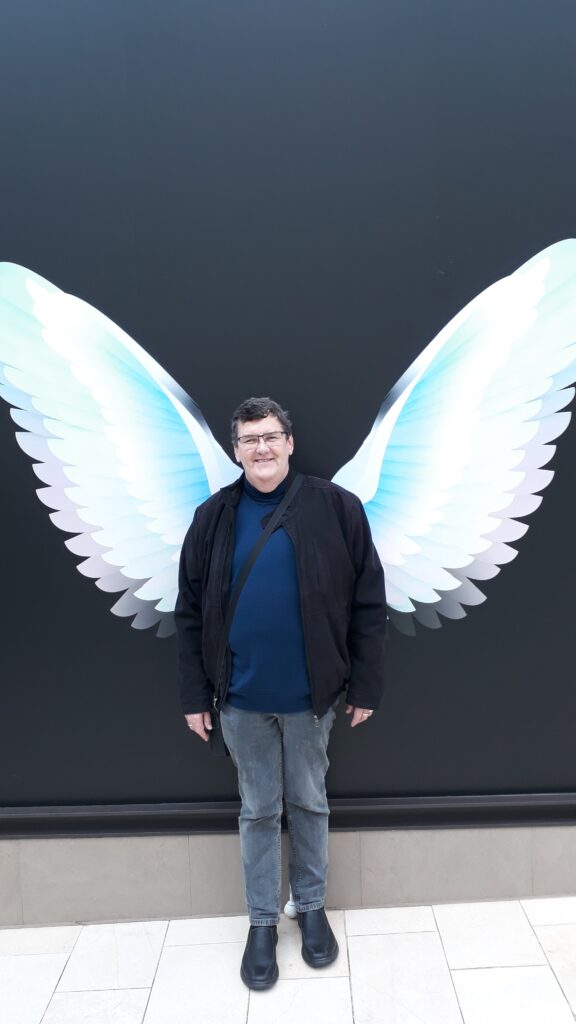
Peter's nominator said:
"He has battled through 50 years of living with his pituitary diagnosis and has championed the cause in raising awareness in the community and with medical staff for many years. He is always willing to listen to people and has been volunteering on your helpline for a long time now. I have no doubt he has saved lives and improved them for many many people. He is also an amazing brother to me and he deserves recognition for all that he has done and achieved over many, many years through his determination to make things better for people without looking for any reward himself."
This is what Peter told us:
During my childhood, I went to see my doctor almost weekly. By now I was having severe earache, being sick, crying with pain. The doctor told my Mum and I that I had a tumour and would have to have an operation. I cried. I was only fourteen. I was admitted to hospital right away.
After explaining to me what was going to happen, I had all my hair cut, then shaved off. I was beside myself. I can remember asking the nurse, to please, please, just leave a little bit on! My operation was a Craniopharyngioma. It took several hours. I was in hospital for about four weeks. I had gained weight. The weight made me look different. My face and head shape had changed. I was having mood swings and ultra-emotional episodes, crying, wanting to run away, poor self-image, no sense of self-worth.
In September, I went back to my school. The pupils who had been praying for me during earlier on, now took the micky out of me. Poked fun at my head (My hair had fallen out again, as a result of the radiotherapy. I also had diabetes insipidus (now AVP Deficiency) and a build-up of fluid on my head.) Many of the teachers had no time for me at all.
I struggled on.
Within two years of the operation, some of the major issues had settled, others were left unresolved. I now hated school because being bullied made me an outcast. I was also moved down a year, in the hope I would be able to catch up on the work I was struggling with. For me, that was the final straw. I hated it. I’d lost my friends, my peer group, my health, and to some extent, my future. My main problems were emotional / behavioural. I cried a lot. I could lose control altogether. I had panic attacks. Teachers, and other adults did not know how to help. I did not know why they happened.
No one seemed to be able to throw any light on this, until I met a specialist in Leicester. He let me look at some of the scans results and explained the Hypothalamus to me. For me it explained how, a well-behaved child and young man, turned into a sobbing, depressed, sad, grieving teenager with poor self-image. No one had ever told me this before. It made a huge difference to me and my parents. I found this out when I was twenty-three years old! nine years after my operation.
With eyesight and other health problems, employment was difficult. Over the years I have been a telephonist, receptionist, office clerk, shop assistant, clerical officer and my last job was with social services. One day, I fell at work. I injured my back and have now a spine condition that has prevented me working at all. Basically, I am a liability. Poor eyesight, back problems, health problems etc = unemployment. My eyesight has worsened over the years, and now I am also getting age related problems like osteoporosis! (More tablets.) I have never been married. I have no children! I missed out on a career. Since my parents have died, I have no immediate family in a hundred-mile radius.
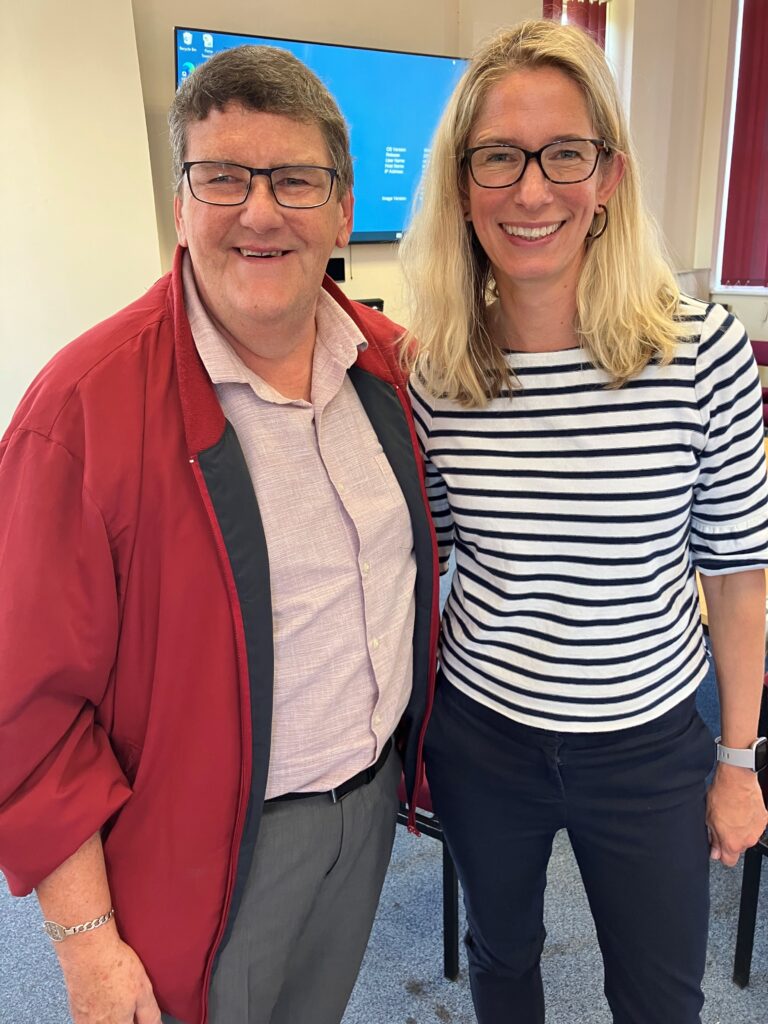
I have coped, sometimes in a fashion, on my own and with the help of my friends.
I will have a go and try anything, especially if it involves helping others.
I have counselling qualifications and do voluntary work for a number of agencies locally. So not only do I benefit by doing these things, but others benefit too.
If I had laid down, and done the “Poor Me” act, no one would have wanted to know me. What I have done for many years is, put the “Slap” on (makeup)…for me that is a smile! Put decent clothes on then got out there and had a go!
Depression and lethargy could have ruled my life. I would not let them. Yes, there have been times when I have not been well, and have given up for a short time, licked my wounds, so to speak. But then I get up and try again.

Risa's nominator said:
"Risa is an incredibly gifted writer, athlete and advocate for acromegaly. She has published an incredible book, “The Road Unpaved”, and also completed a cycling trail from Canada to Mexico. Her book is a poignant, candid and touching personal story of her journey with acromegaly, demonstrating incredible resilience and faith as she navigates the emotional and physical highs and lows of the condition while also embarking on a life changing challenge to cycle from Canada to Mexico. She is a true inspiration and she has shown incredible empathy, compassion and support when I’ve reached out to her. I am so thankful to have found her story and even more thankful that she takes the time to respond when I am in need of support"
This is what Risa told us:
- What’s your story? Why did you start doing what you’re doing, how long have you been doing it?
Following a Pituitary tumor and rare disease diagnosis in November 2018, I discovered that information about Pituitary tumors and pituitary related diseases was lacking. I thought I might bring some attention to it by riding my bike 1,845 miles down the Pacific coast of the US, from Canada to Mexico. Quickly, the medical field and pharmaceutical companies took notice, and I became a voice and a story of hope and inspiration for many. I went on to write my multi-award-winning book that is bringing hope and inspiration to many, and hopefully awareness as well.
- Why you got involved?
I was appalled at the limited information available to those with rare diagnosis. How could I, or anyone else, make adequate and strategic decisions if we don’t have all the information? Looking back, had I had the knowledge I have now, I may have made very different decisions for my treatment. My goal is to help bring attention to Pituitary disorders and diseases, earlier diagnosis, and potentially saving lives. In addition, people from around the world began contacting me wanting to be heard and to share their experiences. I truly love that I can acknowledge others’ journeys while also offering hope and inspiration.
- What would you like to see happen in The Pituitary Foundation for next 30 years?
I would love for the Pituitary to be a part of regular annual medical checkups. I would love the Pituitary to be as common of a topic as is the Thyroid or Diabetes Mellitus is. The Pituitary is the control center of the body after all and it impacts in ways most people don’t even realize. It’s time for the Pituitary to be front and center! The more we understand the Pituitary the more we can combat its malfunctions.
This year marks our 30th anniversary and we are so excited to have a year full of celebrations. Since 1994 we have been supporting anyone affected by pituitary conditions and we will continue to be here for future generations.
We’ve changed a lot in those 30 years, starting from a small group of volunteers and medical professionals. Currently, we have 22 support groups, 2,000 members, and last year alone our helplines have answered over 2,400 phone calls. Today, our cause is still as clear and compelling as ever, to improve care and reduce diagnosis time.
We thank everyone who has supported us during the last 30 years. This is as much a tribute to you as it is to us. We’ve got big ambitions for the next 30 years, and we need your support to reach them.
Some of the actions we will take is starting new support groups, creating more information events for you and visiting 30 endocrine clinics, to raise awareness of our work.
There's lots of ways you can get involved in the celebrations:
- Nominate a Pituitary Hero
- Take on a 30 challenge and raise funds
- Become a member
Please Donate
This year marks our 30th anniversary and we are so excited to have a year full of celebrations. We’ve got big ambitions for the next 30 years, and we need your support to reach them.
We’re asking everyone in our community to get involved with fundraising. You can get involved in any way you like, but we have some ideas already!
Take on a 30 themed challenge to do 30 things to raise money. Maybe you’re going to knit 30 pairs of socks, do 30 acts of kindness, or run 30 miles! It really doesn’t matter what you do as long as you get involved.
We have some ideas of ways to get involved below. Also take a look at our community page, and see how others are raising funds and awareness.
How about getting sponsored to carry out 30 acts of kindness during a month. A great way to spread the love and be as kind as possible – this could really be a great way for children to get involved.
For anyone who enjoys crafty things, why not set yourself a craft challenge. That could be a 24 hour craftathon, knitting 30 items of something, or crafting every day for 30 days. Don’t forget to ask for sponsorship!
Yoga is great for our physical and mental health. You can even make it as easy or challenging as you’d like. How about taking on 30 days of yoga and ask for sponsorship?
Could you refrain from something for 30 days? Maybe stop smoking or drinking alcohol? Give up chocolate, sugar or coffee? If you were to refrain from any of these then it would have a positive impact on your health, and you could ask friends and family to sponsor.
You could even donate the money that you saved!
On the anniversary of your surgery or diagnosis, why not create a Facebook fundraiser to celebrate how far you’ve come in your pituitary journey. It couldn’t be simpler creating Facebook fundraiser. Just select The Pituitary Foundation and share with friends and family.
The perfect opportunity to get together with friends and family. Charge a ticket fee to attend and host a raffle on the evening. If you work for an employer that operates a match funding scheme, then you may even be able to get your fundraising efforts doubled by your company.
Would you have the self-discipline to go an entire 30 hours without talking? It would be quite a challenge, but a great way to fundraise.
Who loves general knowledge? Who’s the music round wizard? Who knows their science facts? You could even add a few unique rounds like a dance off or drawing round. Great fun to host at the local pub, event space or at home. Each team donates to enter.
This is a classic and brave fundraising activity: waxing body hair for charity, cutting your hair into a unique hairstyle or maybe shaving it altogether. Ask people to sponsor you for making such a bold decision and maybe record the event too.
Would you be brave enough?
How about 30,000 steps in a week or why not go even bigger by attempting 300,000 steps in a month? This is great one to work into your daily life and get sponsored for.
If you want to work on your swimming ability, why not set yourself a distance challenge? Or you could take 30 cold plunges for a month!
Maybe you are already a runner or want to start, you could take on a running challenge. Just make sure it’s challenging and has a 30 theme!
How about rowing 30,000km at the local gym, this can be done in one go or several attempts. Or you could even do a rowing event where you try to row for 30 hours straight!
Why not go on a 30-mile bike ride, get some friends to join you so that it’s more of a team effort!
If you are taking on a challenge, remember to let us know, as we are always happy to support in any way we can. You can email us [email protected], or give our office a call 0117 370 1333.







